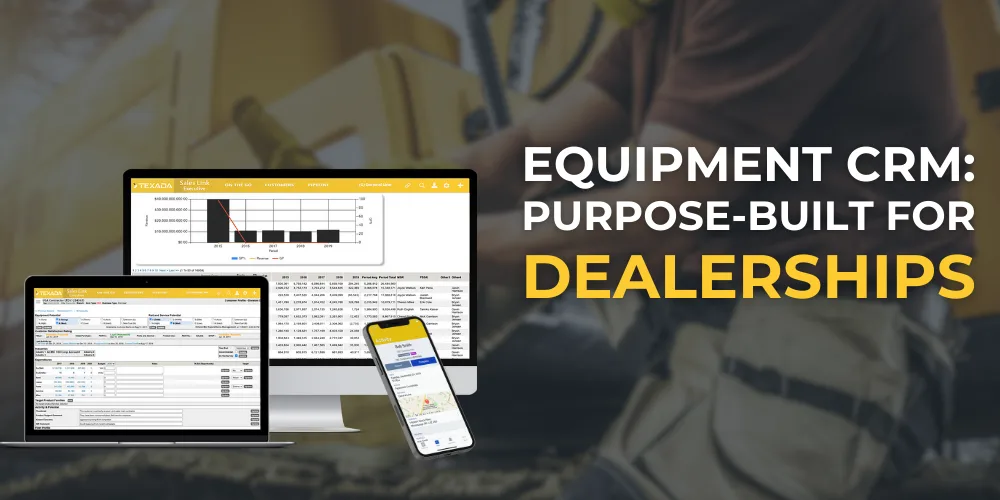Explore the benefits of digitization for equipment dealerships, including how embracing digital technologies can add value in three critical areas of the business.
The equipment dealer landscape is a dynamic sector that is heavily impacted by many of the same market forces, challenges, and trends affecting neighboring industries. In today’s rapidly evolving business environment, one of the most significant drivers of change is digitization.
When it comes to dealerships, Texada Software CEO, Matt Harris breaks down the value of digitization into three areas of benefit:
- Customer Engagement
- Operational Workflows
- Data Mining
Within these areas, equipment dealerships can leverage digitization to produce tangible results and intangible benefits.
1. Customer Engagement
The digitization of customer engagement is a key benefit for equipment businesses.
“Research tells us that in the sales process, most of the engagement of a customer occurs well before they talk to a single salesperson,” said Harris. “Customers are seeking out information-rich environments and engagement well before they walk into your dealership.”
By providing the customer with digital engagement and learning opportunities via the web, chat, social media platforms, or apps, dealers can enable them to participate in the purchasing process well before they ever enter a dealership, or even without entering a dealership at all.
“Today the customer doesn’t need the dealer to give them a spec sheet,” said Ron Slee, Managing Director of Learning Without Scars. “They know the equipment, they know the products, and they know the repair technique because those resources are available to them elsewhere.”
Studies indeed show that customer buying practices have undergone a significant transformation in recent years, with a growing preference for digital experiences. This shift can be attributed to several factors, including technological advancements, changing consumer behaviors, and the convenience offered by online platforms.
One key statistic that highlights this change is the exponential growth of e-commerce. According to data from the U.S. Census Bureau, e-commerce sales in the United States surged by 44 percent in 2020 compared to the previous year, accounting for 21.3 percent of total retail sales. This substantial increase underscores the rapid adoption of digital channels for shopping by consumers.
“That’s the model of the future,” said Harris. “It’s really the way people want to buy. These hybrid business models that combine a physical location with a fantastic digital and e-commerce experience are positioning themselves for success.”
2. Operational Workflows
Another essential component of digitization are operational workflows.
“Digitization can really streamline the steps that it takes your business to get to a sale, or to really focus on what we call this quote-to-cash workflow,” Harris said.
Effective digitization practices have the potential to significantly enhance the efficiency of various business processes. Specifically, they can expedite the quoting process and streamline configuration and pricing procedures, particularly when dealing with intricate equipment or complex service agreements.
“The implementation of digitization can contribute to increased win rates and expedited order processing,” said Harris. “One of its notable impacts is the acceleration of invoicing, ultimately shortening the quote-to-cash cycle. This is an essential aspect for businesses across the industry.”
3. Data Mining
As customer engagements and operational workflows are digitized, a significant amount of data is generated that can be mined and employed to drive improved decision making.
“With digitized processes, past purchases inform future purchases,” said Harris. “Data on service events can also then inform potential rental opportunities. Consistent rental data then informs sales. All of this data can be mined.”
Artificial intelligence can further harness the value of the data.
“With some of the benefits of AI, you can really get into the structured use of unstructured data. There’s a fantastic wealth of opportunity there.”
Take the Next Step Toward Digitization
Equipment businesses are beginning to realize the value of digitization. In a recent report, industry expert Ron Slee, Managing Director of Learning Without Scars, and Matt Harris, Texada Software CEO examined how digitization can affect equipment dealership business leaders and teams today.
Through customer conversations and industry insight, the two provide a deeper understanding into digitization, automation, and other trends influencing the market. Additionally, they offer key strategies for equipment dealerships to better leverage digitization to gain a business advantage. Access the Dealer Digest report today:





